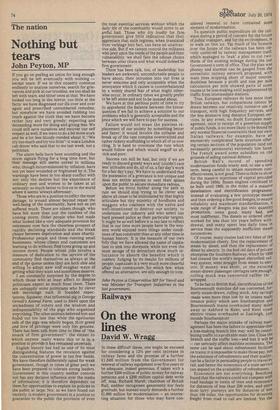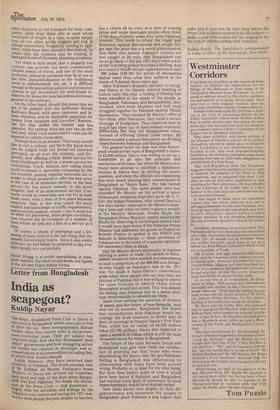On the wrong lines
David W. Wragg
In these difficult times, one might be excused for considering a 121/2 per cent increase in railway fares and the promise of a further £1,500 million from the Government for renewal of railway equipment over five years to be adequate, indeed generous, if taken with a further £500 million of public money for railway pensions and a £200 million capital debt write off. Alas, Richard Marsh, chairman of British Rail, neither recognises generosity nor feels gratitude, but instead sourly demands a further £1,000 million for modernisation — an interesting situation for those who may have con sidered renewal to have contained some element of modernisation.
To question public expenditure on the railways during a period of concern for the future of public transport, and for the environment, is to walk on thin ice. Yet much of the hysteria over the future of the railways has been cle verly contrived by railway management itself, which managed to 'leak' a plan to cut twothirds of the existing mileage during the last Government's term of office. That the plan was phoney and alarmist can be gauged from the unrealistic railway network proposed, with main lines stopping short of major centres, doubtless because a profit and loss per mile calculation per mile showed parts of some routes to be loss-making until supplemented by traffic from intermediate stations.
True, European railways do lose more than British railways, but comparisons cannot be drawn between our relatively intensive use of transport, with high frequency services, and the less intensive long distance European ser vices. In any event, no doubt European man agement, once in receipt of a generous supply of public funds, is no more likely to be bound bY any normal financial constraints than our own. Italian railways, for example, have an excessively complicated fares structure offer ing certain sections of the population (and not necessarily pensioners) extremely low fares. The French award some subsidies on the grounds of aiding national defence. British Rail's, record of spending modernisation funds wisely and, to use a new term, being careful to obtain maximum cost effectiveness, is not good. There is little to show for the massive injections of capital provided during the 1950s. Steam engines continued to be built until 1960, in the midst of a massive dieselisation and electrification programme.
Instead of evaluating a few prototype diesels and then ordering a few good designs, to ensure reliability and maximum standardisation, a wide range of designs was put into quantity production, some good, many bad, and most indifferent. The diesels so ordered often
worked for less than ten years before withdrawal, and many spent less daily time in service than the supposedly inefficient steam locomotives.
Of course, many routes had two bites of the modernisation cherry, first the replacement of steam by diesel, and then the replacement of diesel by electric. In the bad old days of private enterprise the Southern Railway, which by 1939
had created the world's largest electrified railway system, went straight from steam to electric. If money was short, or the existing steam-drawn passenger carriages new enough rolling stock was converted rather thf scrapped.
To be fair to British Rail, electrification of the Bournemouth mainline did use converted, for merly steam-drawn, rolling stock, Any savings
made were more than lost by an insane maintenance policy which saw Southampton and
Bournemouth trains overhauled many miles away at Ashford in Kent, and Kent coast electric trains overhauled at Eastleigh, just outside Southampton!
Perhaps the major mistake of railway management has been the failure to appreciate that
a loss-making branch line may well be contri
buting traffic to a profitable main line. Close the branch and the traffic lost—and lost it will be — can seriously affect mainline economics. The same can be said about refreshment facilities on trains; it is impossible to make those pay, but
the existence of refreshments and their quality, can be a factor in persuading people to travel by rail, and hence the economics of a train service can depend on the availability of refreshment. Economics are not everything. Beeching found that the railways could not compete with road haulage in terms of time and economics for distances of less than 200 miles, and since most lorry journeys are for distances of less than 100 miles, the opportunities for diverting freight from road to rail are limited. Yet the
main objection to rail transport for most companies, other than those able to send whole trainloads of freight at a time, is quite simply that all too often goods wagons get lost in Sidings somewhere, frequently coming to light many miles from their intended destination, by Which time the contents may be missing or damaged in one of the many shunting accidents.
Yet there is little doubt that a properly run railway can provide the most consistently reliable means of travel, and one of the most economic, whatever yardstick may be in use at the time. Denationalisation in the traditional sense is unfortunately not on; it is difficult enough in the prevailing political and economic climate to get investment for well-found in dustries, let alone the now hazardous economic ground of the railways. On the other hand, should this mean that we are to be saddled with the inefficient British Railways Board, with poor customer and labour relations, and an insatiable appetitite for money from taxpayer and traveller? Remember too that unlike the haulier and bus operator, the railway does not pay tax on the fuel used, while track maintenance costs can be equated to vehicle excise duty. . Perhaps there is an answer. That many would like to run a railway and have the know-how can be judged from the preserved railways springing up all over the country, and frequently now offering a basic diesel service for local inhabitants as well as a steam service for enthusiasts. Track, stations and rolling stock could be leased to operating companies by the Government, putting regional networks out to tender to those prepared to offer the best price in the case of an economic service, or the best service for the lowest subsidy in the more frequent case of an uneconomic service. Contracts would be renewable and run for at least three years, with a limit of five years between renewals. Only in this way could the local control and knowledge of traffic requirements, and economic realism, return — but it must not be done too piecemeal, since proper co-ordination requires the involvement of a number of lines within an area not a line or a service at a time Of course, a return of enterprise and a lessening of state control is the last thing that the present Government wants. Since it also wants railways, we had better be prepared to dig ever more deeply into our pockets.
David Wragg is a writer specialising in tran sPort matters. His most recent books are Speed in the Air and Flight before Flying.
Letter from Bangladesh



































 Previous page
Previous page